Views: 83 Author: Site Editor Publish Time: 2023-08-20 Origin: Site
Capable of performing both heating and cooling functions, heat pump systems are becoming increasingly popular. This can be attributed to their energy-efficiency and versatility, as well as tax credits and rebates offered by the government.
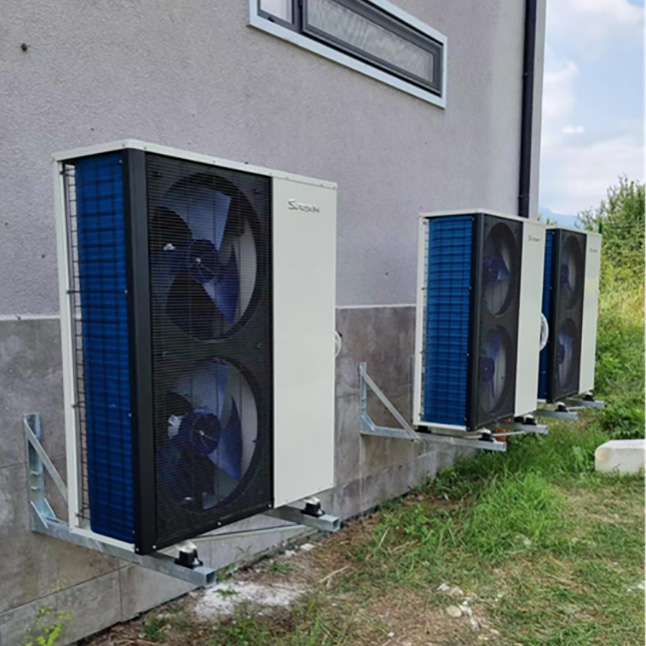
Source: SPRSUN cold climate heat pump
While there are several types of heat pumps, they all share the same working principle. Basically, they transfer heat from the outdoor space into the living space during cold climates and vice versa during hotter temperatures. Heat pumps provide heat in winter and serve as an air conditioning system in summer.
Despite having the same working principle, heat pumps come in wide varieties. In this blog post, we will discuss the different types of heat pumps so that you can choose which one is best for you. Also, we will mention the heat pump pros and cons.
A heat pump is an HVAC (Heating, Ventilation, and Air Conditioning) system that extracts heat from a source (air, water, or ground) and transfers it to another location, effectively distributing warmth to rooms where it’s needed. Heat pumps are energy-efficient and commonly used across every setting, including homes, offices, hotels, industries, etc.
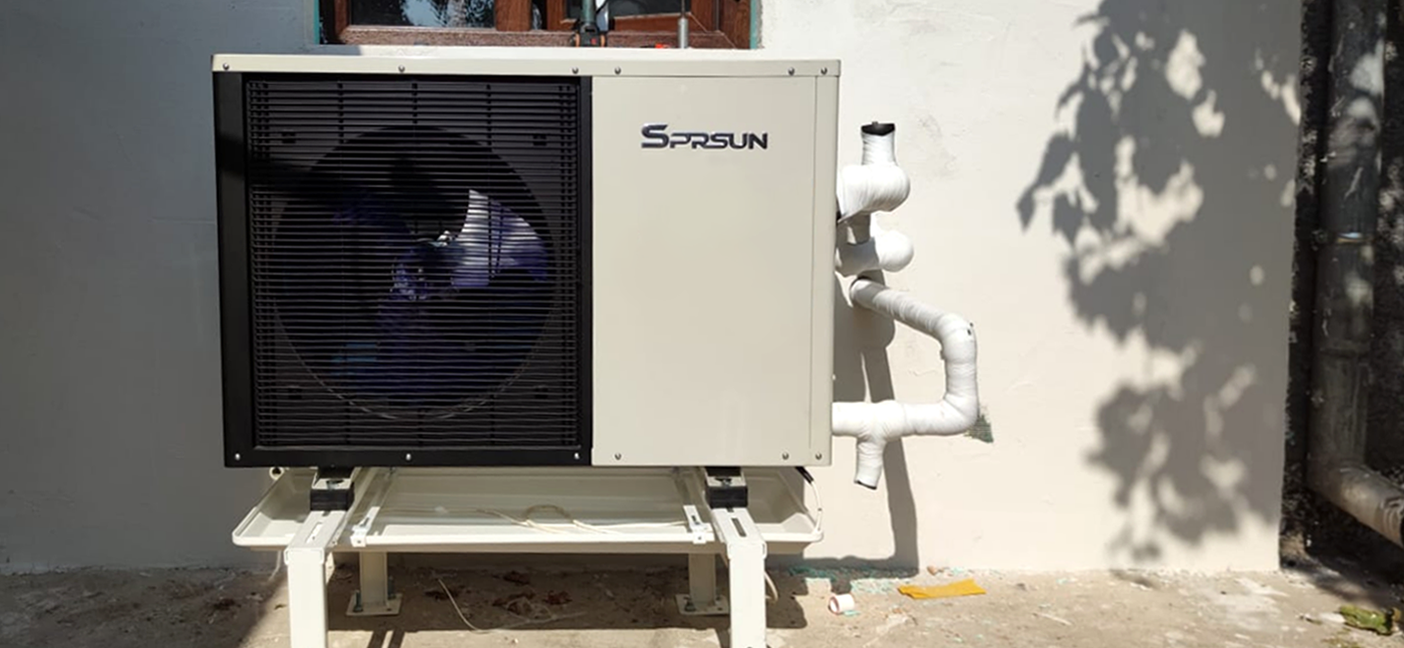
Source: SPRSUN heat pump
Now, what are the different types of heat pumps? They can be classified based on different parameters, such as energy source, hybrid system, structure, refrigerant, application, and current method.
Heat pump systems don’t generate heat, rather they extract and move heat from various sources. These sources are: air, water, and ground.
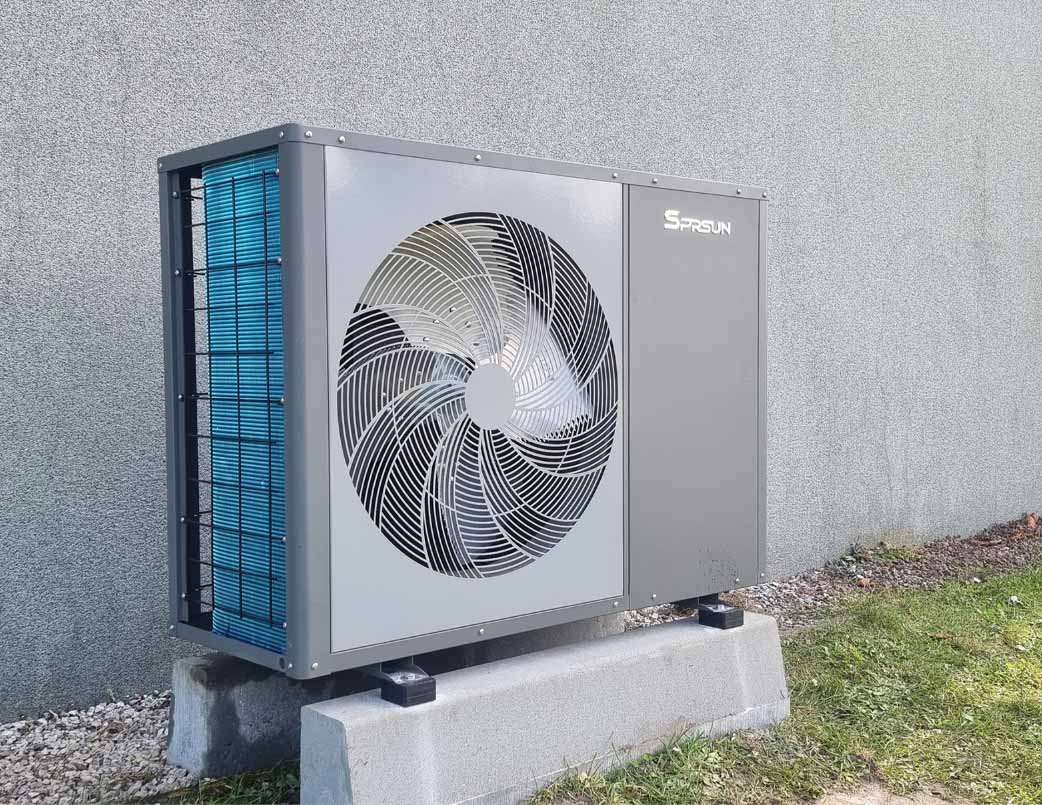
This is the most popular among the types of heating systems. Air source heat pump (ASHP) absorbs heat energy from the outdoor atmosphere and transfers it into the indoor environment. ASHPs consist of an outdoor unit (evaporator coil) and an indoor unit (condenser coil).
There are two types of air source heat pumps:
● Air to Air Heat Pump: Extracts heat from the outside air and move it to the indoor air for heating purposes
● Air to Water Heat Pump: Extracts heat from the outside air and moves it to a water-based system for heating purposes.
● Air source heat pumps are easier and more cost-effective to install than other types of heat pump
● Highly efficient and easy to maintain
● Quiet operation
● Very eco-friendly
● Air source heat pumps are subsidized by the government
● Higher initial cost
● Energy efficiency can be affected by outdoor air temperature

Unlike ASHP, water source heat pumps dissipate heat through water. They use the temperature from underground water sources like lake, well, river, or ocean to transfer heat into living spaces. This type of heat pump can be used for space heating or hot water needs.
● More stable temperature, resulting in better system efficiency
● Highly efficient in moving thermal energy between two places
● Requires lower maintenance costs
● Environmentally friendly
● High upfront cost
● Noise during operation
These heat pump types are a form of renewable energy technology that utilizes the heat stored in the ground. Taking advantage of the thermal energy stored in the ground, they transfer heat in a similar way to ASHP. But because of the constant temperature of the ground, geothermal heat pumps offer greater efficiency.
There are two types of geothermal heat pumps:
Closed-Loop Systems: Circulates a heat-transfer fluid through a closed network of pipes buried in the ground or submerged in a water source
Open-Loop Systems: Uses groundwater or surface water directly as the heat exchange fluid, pumping it through the heat pump’s heat exchanger and discharging it back to the environment.
● Stable temperature and enhanced comfort
● Minimal maintenance over time
● Produce less greenhouse gas than conventional heating systems
● High upfront costs
● Not suitable for all geographical location
● Great harm to the environment
This is a type of heat pump that combines an air source heat pump with an electric resistance heater. The air source heat pump is used when temperatures are above freezing level, and it switches to the electric resistance heater when temperatures are below freezing level. Hybrid heat pump is the best type of heat pump for individuals in environments that experience cold winters and mild summers.
● Greater energy efficiency than single-source heating system
● Reduces energy costs by up to 50% compared to traditional heating processes
● Quiet heating operation
● Low maintenance required due to fewer moving components
● Higher installation costs when compared to other HVAC systems
● Not reliable for freezing climates where temperature drops below -26⁰ Celsius
Knowing the structure and construction of your preferred heat pump will help you communicate better with heat pump suppliers. For instance, while some heat pumps are structured to have one unit, others are constructed to have two.
Below are the types of heat pump systems based on structure:
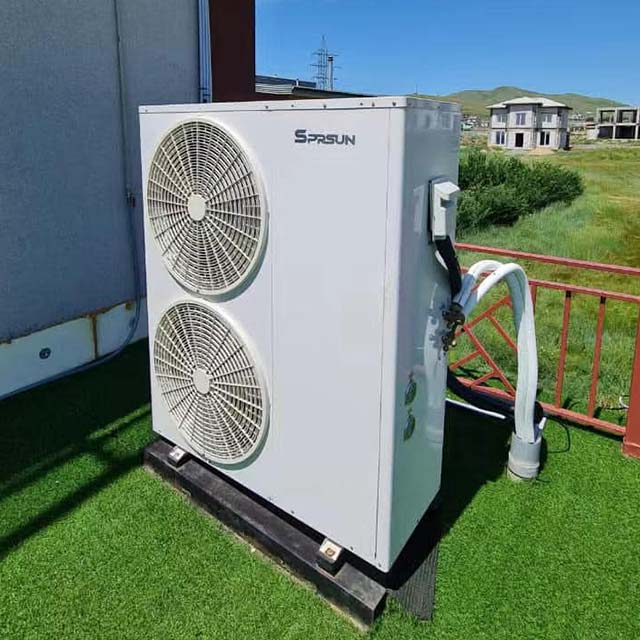
This is one of the types of heat pumps for homes that has all its components, including the condenser, compressor, and evaporator, installed in one unit. Monoblock heat pumps are often used for smaller-scale applications like residential buildings.
● Easier to install due to its compact, one-unit structure
● Suitable for applications with limited space
● Less-efficient compared to split-unit heat pumps
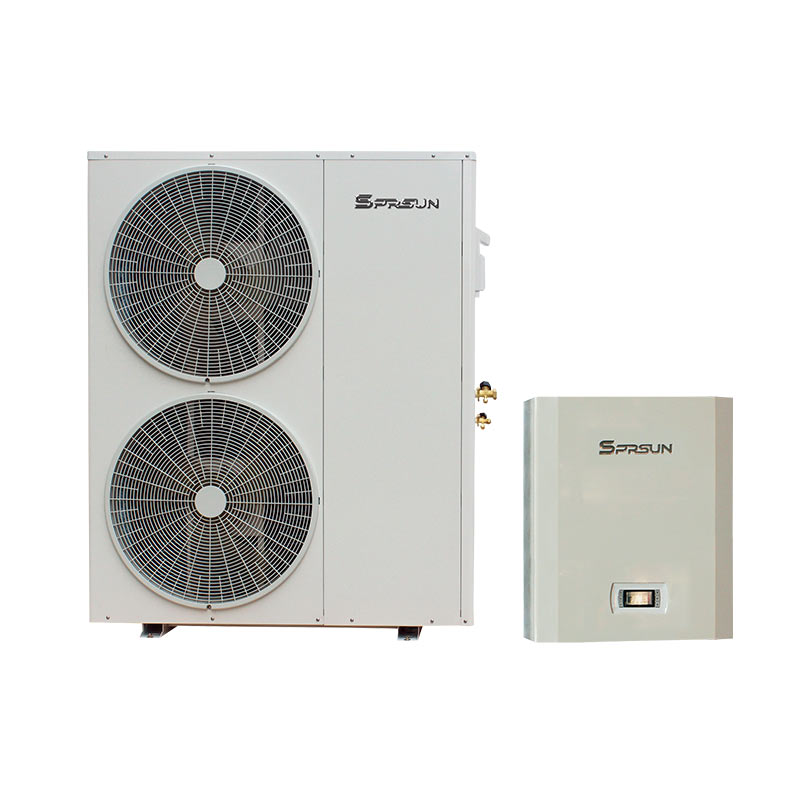
Unlike monoblock heat pumps, this type of heat pump has separate indoor and outdoor units, which are connected by refrigerant lines. The indoor unit contains the evaporator, which is often located in a closet, basement, or attic. The outdoor unit houses the compressor and condenser, located in a large metal box.
● Suitable for wide range of applications
● Can efficiently handle larger heating requirements
● Allows for different temperature control in each room
● More suitable for extremely cold climates than an monoblock heat pump
● Installation complexity due to the need for refrigerant lines between indoor and outdoor units
● Potential efficiency loss
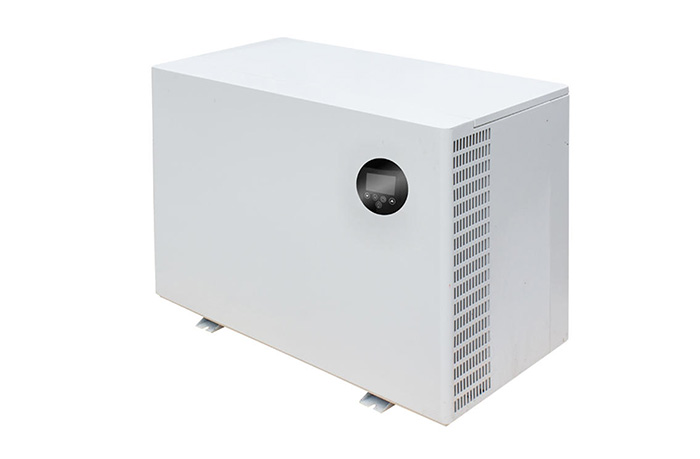
Source: SPRSUN pool heat pump
These heat pump types are designed specifically for heating swimming pools, hence they absorb heat from the air or water and transfer it to the pool.
● Uses ambient air or water, making it energy-efficient for maintaining pool temperatures
● Low operating costs
● Performance can be influenced by climate changes
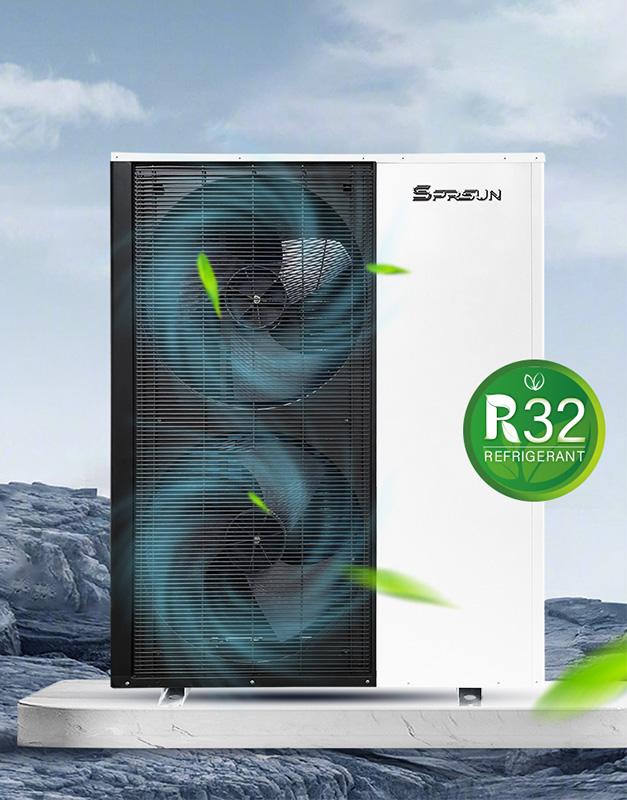
Enhanced Vapor Injection (EVI) heat pumps are different types of heat pumps, as they use a multi-stage compression process to improve heating efficiency in colder climates. These types of heat pumps are reliable in extreme weather conditions.
● Well-suited for regions with very low temperatures
● Maintains excellent performance even in sub-zero conditions
● Has a complex design because of the multi-stage compression system
● High upfront costs
Ducted heat pumps are types of heat pump systems that have a central unit that’s connected to a network of ducts installed throughout the building. The ducts are professionally installed and connected to each room for distribution of heated air.
● Concealed installation, which helps to maintain clean aesthetics
● Provides uniform heating even in larger buildings
● A variety of equipment heating can be implemented, such as underfloor heating, fan coil heating, and heat pump with PV system. And hot water and summer cooling can also be provided.
● Ductwork installation can only be done by professionals
● More expensive
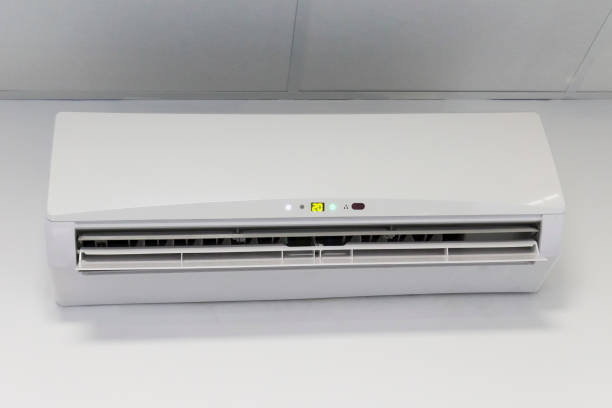
These types of heat pumps have an opposite structure and design to ducted heat pumps. They have an outdoor unit that’s connected to one or more indoor air-handling units, therefore eliminating the need for ductwork installation. Rather than using a home’s existing ductwork to dispense heat, they use indoor units placed in the living space.
● Suitable for independent temperature control in different rooms
● No ductwork required, making installation more simple
● Relatively cheaper
● Indoor units are visible and this can impact the aesthetics of your building
● Less suitable for larger homes because of individual unit capacities
Variable Refrigerant Flow (VRF) heat pumps use refrigerants in capturing and repurposing existing heat in the environment to provide energy-efficient and zone-by-zone comfort control for occupants. VRF heat pumps allow for simultaneous heating and cooling, meaning some parts of the house can be in heating mode when others are in cooling mode.
● Energy efficiency
● Zoning and simultaneous operation
● Installation complexity
● Higher initial costs
This type of heat pump uses a gas-driven cycle usually powered by natural gas to absorb and release heat. Gas absorption heat pumps are more typical to industrial applications. They are measured using Coefficient of Performance (COP) and using this metric, it’s highly efficient.
● Can be more efficient than electric heat pumps
● Ideal for places with unreliable or expensive electricity
● Hard to find
● Might be hazardous to the environment (depending on the gas used).
The next classification is what type of refrigerant is used in heat pumps. Discussed below are the 5 major types of heat pump refrigerants:
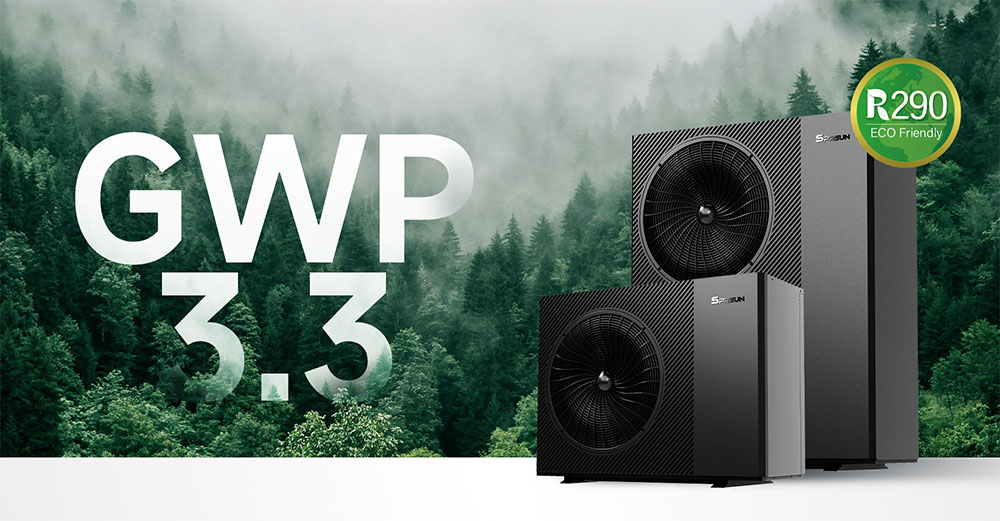
R290 heat pump is a natural refrigerant (propane) that’s popularly used for heat pumps because of its low global warming potential (GWP). While it is environmentally friendly and sustainable, it can be flammable. Thus, it requires special precautions.
● R290 has a very low GWP 3.3, making it sustainable and less effective to climate change
● Has no impact on the environment and provides more efficient heating
● This refrigerant is the latest, and the use of R290 refrigerant is also the latest technology in heat pumps
● Being a hydrocarbon, there are safety concerns about its flammable nature
● This refrigerant is relatively new. This could pose an issue with maintenance and repairs
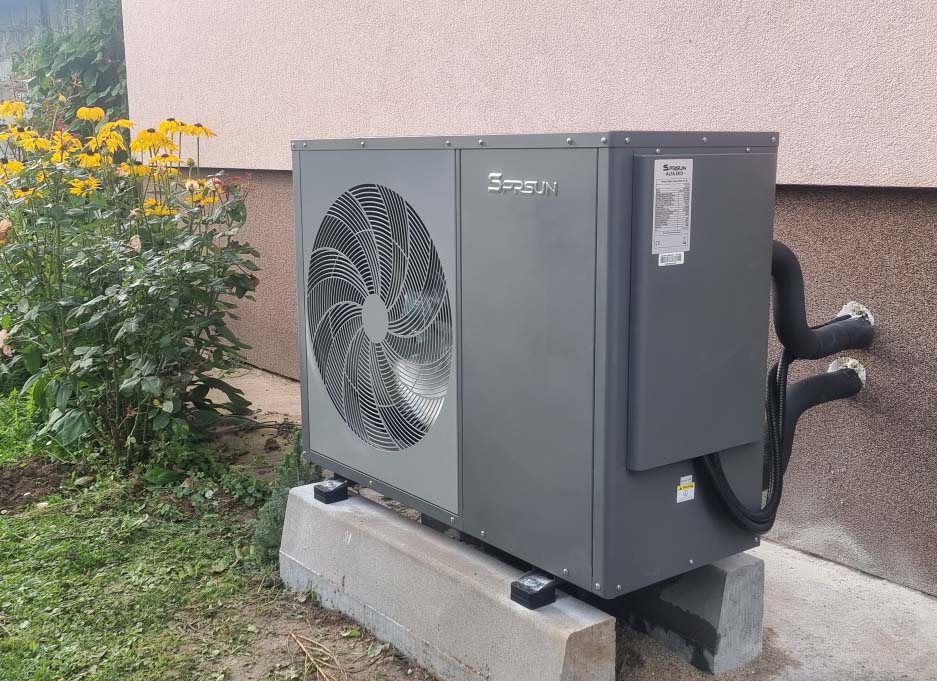
R32 is a low global warming potential hydrofluorocarbon (HFC) refrigerant that’s also popularly used in heat pump systems because of its less-flammable nature. However, it still requires some caution.
● R32 has a lower GWP compared to some other refrigerants like R410A
● Provides high energy efficiency in heat pump applications
● It's less-flammable than R290.
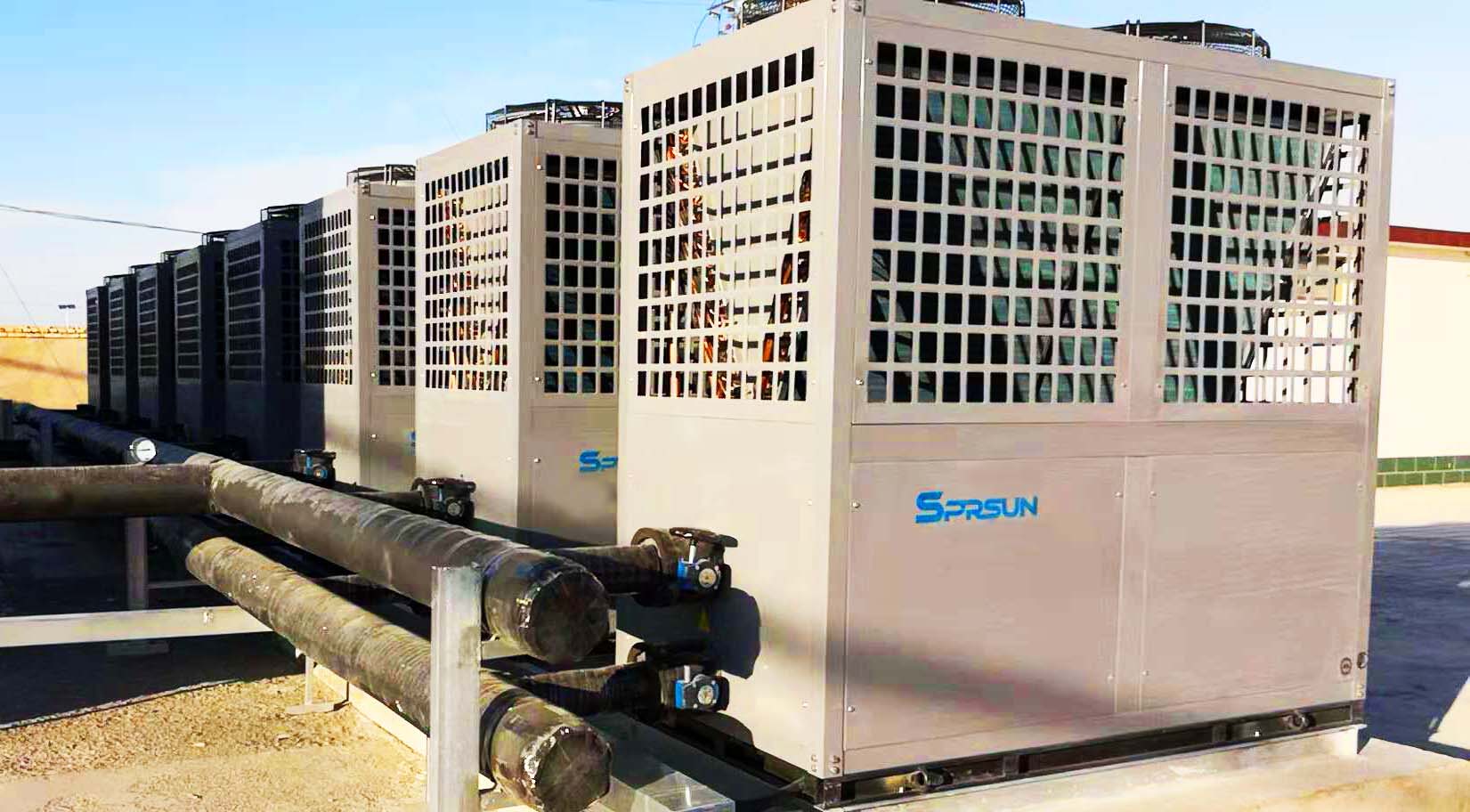
R410A is also a hydrofluorocarbon that’s commonly used in heat pump systems. It is suitable for use across many settings, but it contributes largely to climate change because of its high GWP.
● Excellent energy efficiency for both heating and cooling applications
● Well-established and popularly used in various applications, including home, offices, and industries
● Higher GWP compared to newer versions of refrigerants
● Faces strict regulatory scrutiny with some regions over its negative environmental impact
R407C is a hydrofluorocarbon blend popularly used in heat pump applications because of its balanced efficiency and safety characteristics.
● Offers reasonable efficiency in different temperature conditions
● Unlike refrigerants that use hydrocarbons, it is non-flammable, therefore there’s guaranteed safety
● Although lower than some older refrigerants, it still has a moderate GWP
● Phased out in some parts of the world due to environmental concerns
R134A is a different hydrofluorocarbon refrigerant that’s widely used in automotive air conditioning and some heat pump applications.
● Exhibits good thermodynamic stability
● Non-flammable
● Contributes moderately to GWP, therefore influencing climate change
● Not accepted in some region because of environmental concerns
Another way the different types of heat pumps can be categorized is by application:
Residential heat pumps are designed for homes to offer efficient heating in winter and excellent cooling in summer. They can have their heat sourced from air, water, or ground, and are oftentimes split-systems with indoor and outdoor units. Residential heating and cooling heat pump systems are versatile, providing year-round comfort with several configurations for individual housing types and sizes.
Pool heat pumps are specially designed systems that are configured to heat swimming pools and spas. They absorb heat from the air or water and move it to the pool, ensuring a comfortable water temperature. Pool heating systems are energy-efficient and environmentally friendly, guaranteeing a cost-effective solution for pool owners.
Specially engineered for extreme temperatures, extra cold climate heat pumps are designed to function efficiently in low temperatures. These systems maintain their heating functionalities even in sub-zero conditions, providing reliable warmth for residential and commercial spaces in cold regions.
Commercial heat pumps are constructed mainly for larger-scale applications, including offices, retail spaces, and other commercial buildings. Commercial heating systems are designed to handle higher heating loads, providing energy efficient solutions for maintaining comfortable indoor environments.
Industrial heat pumps are built for heavy-duty applications in industrial settings. They can provide heating solution for manufacturing, drying, and other industrial processes. Industrial heating systems contribute to energy efficiency and sustainability in industrial operations by using renewable energy sources like air, water, and ground.
Combining photovoltaic (PV) systems with heat pumps creates a sustainable solution for both electricity generation and space heating. PV systems generate electricity from sun rays, which is then used to power the heat pump. This integration enhances renewable energy utilization and minimizes dependence on traditional grid power.
Another form of classifying the types of heat pumps is by their pattern of current transfer:
DC inverter heat pumps use a direct current (DC) compressor motor and variable speed technology to modulate the heating or cooling output. The compressor speed changes in accordance with the temperature requirements, allowing for precise and efficient control of the indoor temperature.
● Ensures energy efficiency by modulating the compressor speed to align with the heating demands
● Provides a more accurate and consistent temperature control
● Higher initial costs compared to AC inverter models
● Due to its use of advanced technology, there is higher maintenance costs
Just like DC inverter heat pumps, AC inverter heat pumps also use variable speed technology but they operate on alternating current (AC). This type of current method adjusts the frequency of the AC power to regulate the compressor speed, as well as the heating output.
● AC inverter technology improves energy efficiency by adjusting the compressor speed
● DC inverter heat pump are more energy-efficient than AC heat pump
● Might experience slight temperature fluctuations during operation
● May not have the same level of control as DC inverter heat pumps
Now that you know the various types of heat pump systems, how can you choose the best type for your needs?
Below are the factors you need to consider to make an informed decision about the most suitable types of heat pumps for homes, offices, commercial, industrial applications, and many more.
● Climate and Location: Various heat pump types are built to perform differently depending on the climate condition. Consider the average temperature of your location over time, as well as the hottest and coldest it gets. This will help you choose a heat pump that fits your environment.
● Available Space: Some types of ground source heat pumps like horizontal or vertical loops may require more space for installation. Also, split heat pumps come with both indoor and outdoor units, so there must be available space outside to accommodate the outdoor unit.
● Energy Efficiency: The functionality of heat pumps are largely determined by their energy efficiency, which are popularly measured by Seasonal Energy Efficiency Ratio (SEER) and Heating Seasonal Performance Factor (HSPF). Ensure you choose heat pumps with higher SEER and HSPF ratings.
● Cost: Consider your budget for both the initial purchase, installation, and maintenance cost. Some types of heat pumps like ground source heat pumps have higher cost but could yield long-term savings in energy efficiency.
● Zoning and Temperature Control: If you have specific preferences concerning the temperature in different areas of the building, prioritize heat pump systems that have zoning capabilities, such as ductless/mini-split heat pumps.
● Regional Regulations: Be aware of the regulations governing your region about the use of heat pumps. For instance, some areas have strict laws concerning the types of refrigerants your heat pump should have.
SPRSUN is a professional manufacturer and supplier of heat pump wholesale systems, providing customers across the world with high-quality and easy-to-install heat pumps. Our heat pumps are certified by MCS, TUV, Keymark, CE, ERP and other certificates. With over 20 years of experience and technical know-how, we’ve garnered sufficient knowledge on the most suitable types of heat pumps for each individual, depending on their demands.
Communicate with us and get expert help on the best type of heat pump for your project.
2021-12-06
2022-01-07
2021-10-30
2021-11-30
